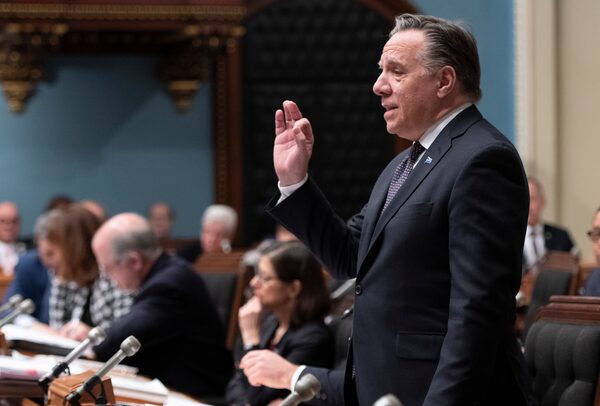
Quebec Premier François Legault, right, responds to the Opposition during question period, Friday, February 7, 2020 at the legislature in Quebec City.Jacques Boissinot/The Canadian Press
The Coalition Avenir Quebec government is set to invoke closure for a fourth time in eight months as it looks to pass an education bill that would spell the end of school boards across the province.
The proposed legislation, expected to pass early Saturday thanks to a Coalition majority at the national assembly, keeps with a Legault government promise to abolish school boards in favour of so-called service centres.
The bill will also do away with French school board elections, although English boards will be allowed to keep their elections in part after.
Opposition parties were critical of the Legault government’s plan to push through the reforms through closure — which will cut short the discussion and force a vote on the legislation, known as Bill 40.
But Premier François Legault has blamed the opposition for the decision to invoke closure, saying they’re needlessly extending the debate and obstructing the process.
Opposition parties have countered that the Legault government is heavy-handed in its rush to pass bills at full speed, cutting short the debates that often serve to improve them.
Opposition parties called on the Speaker of the national assembly to stop the government from invoking closure on Friday, but Francois Paradis ruled his hands were tied, saying it was part of procedures in place and up to lawmakers to change those procedures.
Closure is often used to pass legislation at the end of a session, but in this case the legislature had only resumed sitting on Tuesday.
Legault has been claiming for months that his ministers spend too many hours in a parliamentary committee to defend their bills.
Introduced last October and having undergone nearly 70 hours of detailed study at committee, the government decided this week that Bill 40 had been through enough scrutiny.
The text of the proposed law contains some 300 articles, and more than 160 pages of amendments were tabled by Education Minister Jean-Francois Roberge this week.
Roberge has said eliminating boards will mean $40-million more to inject into schools over time — which will mean better support staff and other investments.
The bill would also expand the education minister’s powers to set targets for the new service centres as well as change other aspects of the education system.
The province’s proposed reforms have their share of opponents, including teachers’ unions and school board associations, which have threatened legal action.